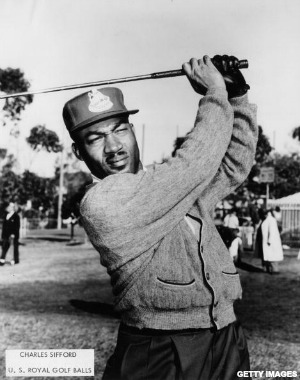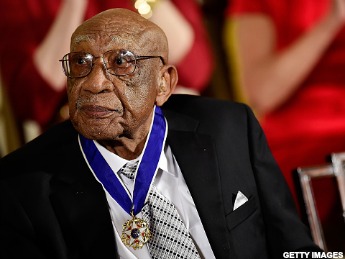In 1961, Charlie Sifford became the first black golfer to receive his PGA Tour card. That's why, at 92, Sifford received the Presidential Medal of Freedom from Barack Obama.
The honor is the highest bestowed upon a civilian, and it's more than fitting for a man that entered golf at a time when the PGA Tour had a "Caucasians Only" clause, as noted by Bill Dwyre in a column for the Los Angeles Times.
But it's still bittersweet in some ways: Not just because Sifford had to be granted access in the first place, and not just because Sifford was never fully accepted into the golf world (he never played in The Masters, a barrier not broken until 1975). Sifford's PGA career is bittersweet because it didn't begin until he was 38. By then, much of his prime had already passed. Tiger Woods is 38, and injuries aside, his best years are well behind him.
Sifford turned pro in 1948 and won six Negro opens, including five straight from 1952 through 1956. He first tried to qualify for a PGA Tour even in 1952 and endured threats on his well-being. In 1957, he won the Long Beach Open against a field that included prominent, white PGA golfers.
Finally, in 1961 he made the PGA Tour. And that's where he stayed, winning PGA events in 1967 and 1969.

Sifford was a quiet man, preferring to speak through his performance. He was angry, but he tried to let that frustration fuel his desire. According to then-Times columnist Jim Murray, writing about Sifford ahead of the '69 Los Angeles Open that he won:
"Golf was not a game for ghettos. Neither did it leave any time for carrying picket signs, joining demonstrations or running for office. Charlie birdied, not talked, his way through society prejudice. He broke barriers by breaking par. His weapon was a nine-iron, not a microphone."
Most of the time, Sifford kept his teeth fixed on a cigar he often smoked while he played.
Sifford went on to enjoy the game for many years, winning the 1975 PGA Seniors' Championship and participating in the Liberty Mutual Legends of Golf tournament, where he won as recently as 2000.
Now, Sifford is witness to a generation of golfers that grew up idolizing a black golfer in Woods. Before Woods was even born, it was men like Sifford who stuck with a sport and professional tour that was resistant to his presence.
What would Sifford's career have been if he could have been allowed on the PGA Tour earlier? Despite his Negro Tour dominance, it's hard to know for sure.
Instead, Sifford's legacy is one of breaking down barriers. While a more noble distinction than any golf trophy, Sifford's Presidential Medal of Freedom is also a form of atonement. He was never granted the chance to realize his full potential at the PGA level.
As Charlie Sifford is celebrated for the man he was, he should also be honored for the golfer he wasn't allowed to become.





